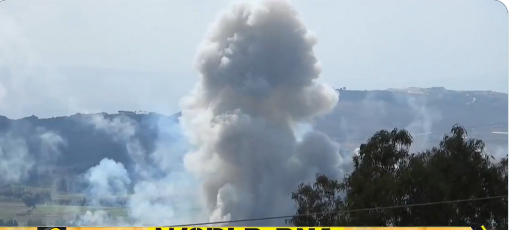The air hums with tension… the ground shakes with impact… South Lebanon—strewn with the aftermath of Israeli airstrikes. At least 492 lives were lost on Monday alone, making it one of the deadliest days the country has seen since its brutal civil war, long past but never forgotten. The toll of Monday’s strikes, echoing across 1,300 targets, left behind a grim tally of death and destruction, while roads north remain clogged with cars, as thousands flee the ongoing onslaught.
By Tuesday, the tally only worsened—558 dead, 1,835 wounded… and no end in sight. Hezbollah, retaliating with missiles in the night, targeted eight sites inside Israel, including an explosives factory 37 miles away. It’s the back-and-forth rhythm of war—each side taking turns, striking, retaliating, while the civilian world trembles in fear.
GENOCIDAL !!!! 🇮🇱🇱🇧 Israeli attacks on Southern Lebanon cause 492 deaths, Lebanese Ministry of Health emergency center reports
“The raids killed 492 people, including 35 children and 58 women, and injured 1,645,” the statement said. pic.twitter.com/KaaWcCxVRQ
— Ryan morton CITIZEN JOURNALISTS (@Ryanmor54929339) September 24, 2024
Israel, untouched by fatalities since Monday, counts its wounded—a legacy of Hezbollah missile and drone attacks just days prior. The mounting tension between these two players feels… dangerously on edge. Twin attacks on Tuesday and Wednesday last week left the ground smoldering, while thousands of Hezbollah devices—pagers, radios—blew apart, killing 39. No official word from Israel on whether they were behind it, but the world whispers it… pointing fingers in Tel Aviv’s direction.
The uneasy dance between Hezbollah and Israel began last October, with rockets raining down after Hamas attacked in the south. Since then, daily border clashes have displaced tens of thousands—lives on hold, houses abandoned. Now, the crescendo. In a single week, the intensity surges, Israeli Defence Minister Yoav Gallant calling it a “significant peak.”
Lebanon says Israeli airstrikes kill at least 492, residents flee from south#rajbirmangat#rajbirsinghmangat#lebanonisrael #israelhezbollahlatestnews #israelhezbollah #middleeast pic.twitter.com/SXpLGl6WGK
— Rajbir Mangat (@rajbirmangat) September 24, 2024
Prime Minister Netanyahu himself pleaded for civilians in South Lebanon to escape—his video message, urgent, in English: leave now, before it’s too late. And so they left… highways in the north jammed with cars… families clutching whatever they could grab, documents in hand, fleeing a landscape littered with explosions.
Lebanon says at least 492 people killed as Israel launches 650 attacks on nearly 1,600 Hezbollah targets
Iran-backed group retaliates, launches dozens of missiles at Israel
UN asks Israel and Hezbollah to ‘step back from the brink’@shivanchanana tells you more pic.twitter.com/Vhlh7qkDR9
— WION (@WIONews) September 24, 2024
Temporary shelters now offer safety to some, though only for a fraction. Schools and public buildings, hurriedly converted, welcome tens of thousands, while Beirut’s hotels, now at full capacity, open their doors for the displaced. The city, where everything once seemed stable, now bursts at the seams… a place of refuge in a nation marked by unrest.
Major Points
- Israeli airstrikes on South Lebanon left 492 dead on Monday, with the toll climbing to 558 by Tuesday as the region faces one of the deadliest days since the civil war.
- Roads remain clogged as thousands flee north, responding to Israeli Prime Minister Netanyahu’s urgent call for civilians to evacuate before further attacks.
- Hezbollah retaliated with missile strikes, targeting eight sites in Israel, including a factory, intensifying the back-and-forth conflict between the two sides.
- The conflict escalated after a series of attacks last week that destroyed Hezbollah’s communication devices, though Israel has not officially claimed responsibility.
- Temporary shelters and schools in Beirut struggle to accommodate the tens of thousands of displaced civilians fleeing the ongoing violence, while the city’s hotels are at full capacity.
Kirk Volo – Reprinted with permission of Whatfinger News


